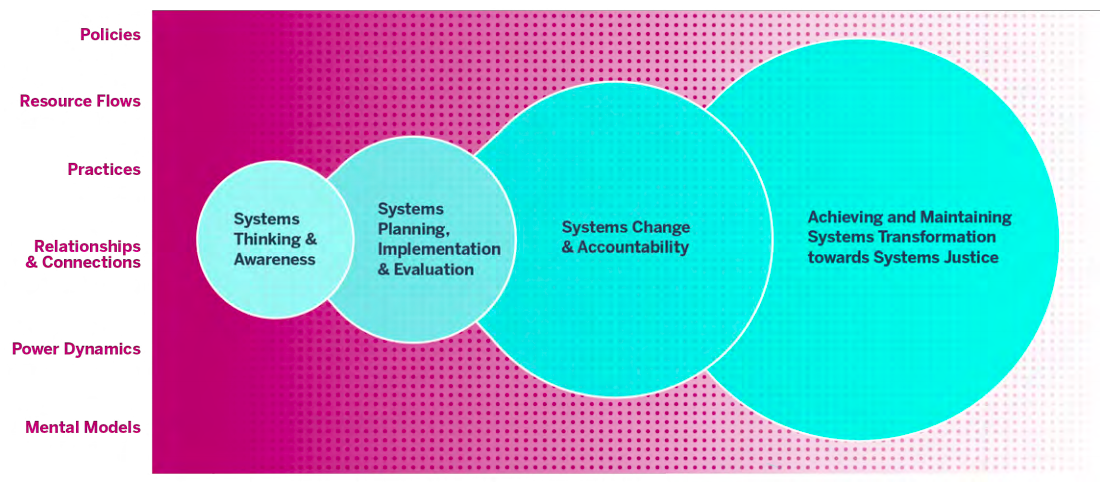What would our communities look like if all systems and sectors worked in solidarity to prevent and end homelessness?
It’s been difficult for service providers and community organizations to keep their heads above water over the past year, let alone set time aside to deeply consider the state of systems planning and change within their communities. For members of the Systems Planning Collective (SPC) Community of Practice, trends and forces of COVID-19 and movements for equity and justice experienced nationally ended up providing the fertile ground for exploring the need for a shift to rights-based, cross-systems, prevention approaches to prevent and end homelessness. The result of rich discussion and dialogue taking place over the better part of last year within the Community of Practice, and interviews with representatives from various positions within the social services ecosystem, is a Preliminary Report and Framework for Systems Transformation.
This first blog in a multi-part series, introduces the learnings and themes within the State of Systems Approaches to Preventing and Ending Homelessness in Canada report. Subsequent blog posts will unpack and reflect upon the ideas presented in this Preliminary Report to make connections between concepts and real-world practice.
About the Community of Practice
The Community of Practice (CoP) is composed of people from all across Canada working within municipal governments, local/provincial/territorial coalitions, and community organizations who are leading efforts to address homelessness and related challenges. Some members self-identified as Indigenous and some noted having lived experience of homelessness. There is also strong representation of youth-focused prevention initiatives within the CoP. The SPC Project Management Team that provides logistical and facilitation support to the CoP includes representatives from A Way Home Canada, the Canadian Observatory on Homelessness and HelpSeeker Technologies. This group is by no means completely representative of the range of perspectives in Canada, and our goal is to grow the CoP and connect with people from other systems, sectors, other related initiatives and lived experiences to further strengthen and diversify the knowledge exchange and content creation.
Why a State of Systems report?
The Systems Planning Collective partners have heard in their individual capacities for years, as well as while working collaboratively on various projects, that the current slate of resources, tools and approaches to preventing and ending homelessness in Canada, while good, can only go so far once you bump up against system-level issues. In response to a growing need for communities and organizations who are ready to engage in systems approaches to preventing and ending homelessness, the Preliminary Report was developed to bolster the growing discourse on this subject and validate the current realities of those individuals and communities working in this space. The contents of this report are presented at a high level with the goal of exploring the topics and questions in greater depth with the SPC’s Community of Practice and across our members’ and partners’ efforts. At the end of the report we outline next steps and opportunities.
Key Themes
We used the Six Conditions of Systems Change from FSG to ground conversations with the CoP and key informants, group concepts and surface ideas. Equally influenced by the calls for systemic reform and justice-based initiatives happening globally, a framework emerged to articulate the current state of systems approaches and the future vision of systems-based work grounded in commitments to equity and justice. You can see a visualization of the Systems Transformation Framework below:


The Preliminary Report explores opportunities, challenges, and questions using this framework as a container for both discussion and surfacing ideas for action and change.
So what?
If the report is a deep-dive into the conditions at play challenging or supporting systems approaches to prevent and end homelessness, what do we do with this information? How does this help to mitigate the conditions currently working against the ability to engage in systems transformation and a long-term vision of systems justice? How do we build on the processes and work currently underway which are moving systems transformation forward?
While some questions remain, we have a stronger sense of the conversations we need to be having in our communities and at the national level. In addition to understanding the challenges facing communities, we can take collective action and learn from each other knowing:
- There is greater openness to having difficult, revealing conversations and (re)evaluate what communities, systems and governments are doing through an equity lens.
- Examples of systems change and transformation exist at the local level and can provide insight and learnings for others at various stages of cross-systems work to prevent and end homelessness and pursue individual and community wellbeing.
- People want to take action to realize the transformation they hope to see in their communities.
We want to encourage those engaging in the difficult work of building cross-systems partnerships and solidarity for preventing and ending homelessness that you are not alone! The journey toward systems transformation will be a shared one, and we see the potential for furthering these conversations and driving action together. If the Preliminary Report resonates with you, inspires you, or raises new questions or thoughts, the Systems Planning Collective would love to hear from you.
The Systems Planning Collective invites you to join us on this path and attend our national dialogue webinar on Thursday June 10th from 1:00pm-2:30pm EST where we discuss the Preliminary Report with community organizers and leaders. Bring your ideas and reflections to the conversation and help us start to build the foundational relationships that will bring us closer to systems transformation and justice!
Stay tuned for part two in this blog series coming soon!

